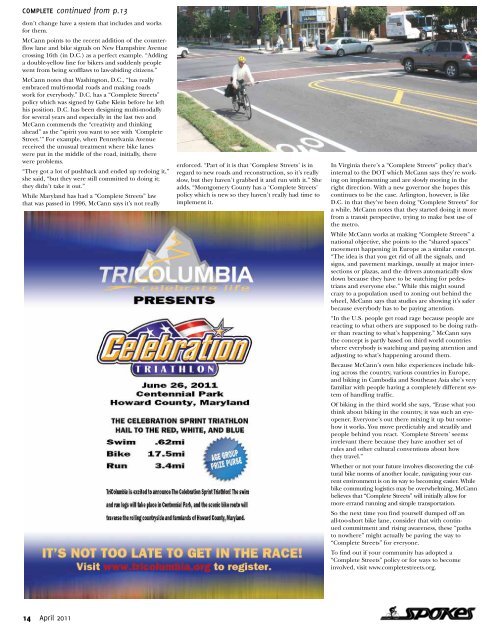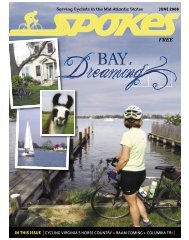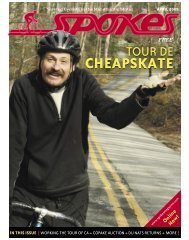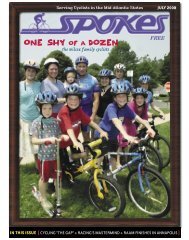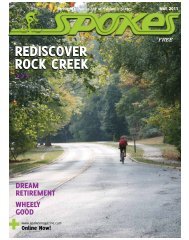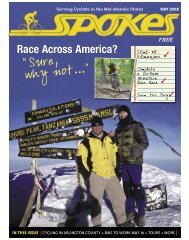April 2011 - Spokes Magazine
April 2011 - Spokes Magazine
April 2011 - Spokes Magazine
Create successful ePaper yourself
Turn your PDF publications into a flip-book with our unique Google optimized e-Paper software.
complete continued from p.13<br />
don’t change have a system that includes and works<br />
for them.<br />
McCann points to the recent addition of the counterflow<br />
lane and bike signals on New Hampshire Avenue<br />
crossing 16th (in D.C.) as a perfect example. “Adding<br />
a double-yellow line for bikers and suddenly people<br />
went from being scofflaws to law-abiding citizens.”<br />
McCann notes that Washington, D.C., “has really<br />
embraced multi-modal roads and making roads<br />
work for everybody.” D.C. has a “Complete Streets”<br />
policy which was signed by Gabe Klein before he left<br />
his position. D.C. has been designing multi-modally<br />
for several years and especially in the last two and<br />
McCann commends the “creativity and thinking<br />
ahead” as the “spirit you want to see with ‘Complete<br />
Street.’” For example, when Pennsylvania Avenue<br />
received the unusual treatment where bike lanes<br />
were put in the middle of the road, initially, there<br />
were problems.<br />
“They got a lot of pushback and ended up redoing it,”<br />
she said, “but they were still committed to doing it;<br />
they didn’t take it out.”<br />
While Maryland has had a “Complete Streets” law<br />
that was passed in 1996, McCann says it’s not really<br />
enforced. “Part of it is that ‘Complete Streets’ is in<br />
regard to new roads and reconstruction, so it’s really<br />
slow, but they haven’t grabbed it and run with it.” She<br />
adds, “Montgomery County has a ‘Complete Streets’<br />
policy which is new so they haven’t really had time to<br />
implement it.<br />
In Virginia there’s a “Complete Streets” policy that’s<br />
internal to the DOT which McCann says they’re working<br />
on implementing and are slowly moving in the<br />
right direction. With a new governor she hopes this<br />
continues to be the case. Arlington, however, is like<br />
D.C. in that they’ve been doing “Complete Streets” for<br />
a while. McCann notes that they started doing it more<br />
from a transit perspective, trying to make best use of<br />
the metro.<br />
While McCann works at making “Complete Streets” a<br />
national objective, she points to the “shared spaces”<br />
movement happening in Europe as a similar concept.<br />
“The idea is that you get rid of all the signals, and<br />
signs, and pavement markings, usually at major intersections<br />
or plazas, and the drivers automatically slow<br />
down because they have to be watching for pedestrians<br />
and everyone else.” While this might sound<br />
crazy to a population used to zoning out behind the<br />
wheel, McCann says that studies are showing it’s safer<br />
because everybody has to be paying attention.<br />
“In the U.S. people get road rage because people are<br />
reacting to what others are supposed to be doing rather<br />
than reacting to what’s happening.” McCann says<br />
the concept is partly based on third world countries<br />
where everybody is watching and paying attention and<br />
adjusting to what’s happening around them.<br />
Because McCann’s own bike experiences include biking<br />
across the country, various countries in Europe,<br />
and biking in Cambodia and Southeast Asia she’s very<br />
familiar with people having a completely different system<br />
of handling traffic.<br />
Of biking in the third world she says, “Erase what you<br />
think about biking in the country, it was such an eyeopener.<br />
Everyone’s out there mixing it up but somehow<br />
it works. You move predictably and steadily and<br />
people behind you react. ‘Complete Streets’ seems<br />
irrelevant there because they have another set of<br />
rules and other cultural conventions about how<br />
they travel.”<br />
Whether or not your future involves discovering the cultural<br />
bike norms of another locale, navigating your current<br />
environment is on its way to becoming easier. While<br />
bike commuting logistics may be overwhelming, McCann<br />
believes that “Complete Streets” will initially allow for<br />
more errand running and simple transportation.<br />
So the next time you find yourself dumped off an<br />
all-too-short bike lane, consider that with continued<br />
commitment and rising awareness, these “paths<br />
to nowhere” might actually be paving the way to<br />
“Complete Streets” for everyone.<br />
To find out if your community has adopted a<br />
“Complete Streets” policy or for ways to become<br />
involved, visit www.completestreets.org.<br />
14 <strong>April</strong> <strong>2011</strong>


